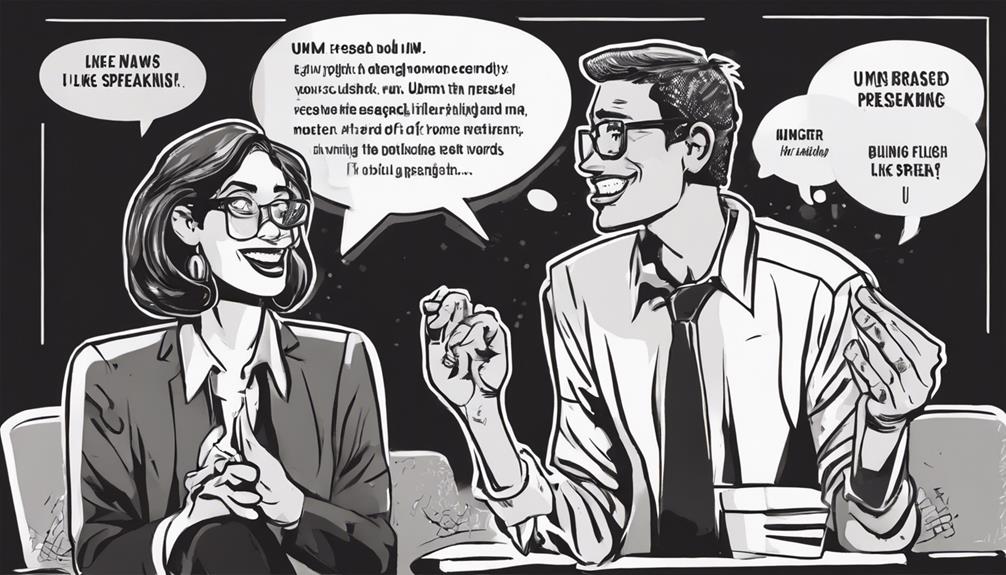To captivate your audience and excel as a public speaker, remember these eight essential tricks: Understand your audience, share valuable insights, cut out filler words, use scripts or notes, move around the stage, simplify your message, simplify further, and forgive mistakes to move forward positively. Mastering these strategies will help you engage, inspire action, and create a lasting impact on your listeners. Follow these tips to enhance your speaking skills and leave a mark on any audience you address.
Key Takeaways
- Craft personal stories for emotional connection.
- Deliver practical advice for relevance.
- Utilize strategic pauses for impact.
- Practice stage movement for engagement.
- Embrace forgiveness to maintain audience focus.
Know Your Audience
To become a good public speaker, understanding your audience is vital for delivering a compelling and impactful speech. When it comes to public speaking, building trust with your audience is key. You need to make sure you take the time to understand their interests, problems, and prior knowledge.
By familiarizing yourself with the schedule and mood of the audience, you can tailor your message accordingly. It's important to identify ways to connect with the audience to enhance engagement and receptiveness to your speech. Additionally, considering factors such as previous speakers and timing can help you adapt your delivery to suit the audience better.
Knowing the audience's perspective not only enhances your credibility as a speaker but also guarantees that your message resonates effectively. Trust, connection, and adaptability are the pillars of successful public speaking.
Give Value, Inspire

Providing valuable insights and inspiration during your speech is essential for engaging your audience and leaving a memorable impact. To effectively give value and inspire your audience, consider the following:
- Connect Emotionally: Share personal stories and experiences that resonate with your listeners, creating a deep emotional connection that captivates their attention.
- Offer Practical Advice: Providing actionable tips and advice allows your audience to walk away with tangible steps they can implement in their lives, making your speech more impactful and memorable.
- Share Wisdom and Knowledge: Imparting your expertise and wisdom on a subject not only showcases your credibility but also builds trust with your audience, leading to a more meaningful exchange of ideas.
Eliminate Filler Words

Minimizing filler words in your speeches is essential for enhancing credibility and maintaining audience engagement. Filler words like 'um' and 'uh' can detract from your message, making you appear less confident and knowledgeable.
Instead of using these fillers, practice pausing strategically to gather your thoughts. This not only eliminates distractions but also demonstrates control and authority while speaking.
Recording your speeches can be a valuable tool in pinpointing where filler words tend to creep in. By identifying these patterns, you can actively work on replacing them with silence or more impactful words.
Increasing your awareness of filler words and consistently practicing will help you become a more polished and compelling speaker.
Use Script or Notes

Consider integrating a well-prepared script or notes to enhance the structure and delivery of your speeches. Having a script or notes reduces the chances of forgetting key points during a speech, making sure you stay on track and deliver a well-organized message.
Annotated scripts can include stage directions for effective delivery and timing, enabling you to make impactful pauses and gestures. Preparation through notes guarantees coherence and clarity of your speech, aiding you in conveying your ideas in a more orderly manner.
Different speakers may use various methods such as flashcards, bullet points, or detailed scripts based on their preferences. Utilizing a script can offer a safety net, enabling you to maintain focus and deliver your speech confidently.
Move Around Stage

As you take the stage, remember that strategic movement can emphasize your key points and captivate your audience. Utilizing appropriate gestures and stage presence not only conveys confidence but also keeps your listeners engaged.
Moving around the stage prevents monotony and guarantees your audience stays focused on your message.
Stage Movement Impact
Enhancing your public speaking skills involves incorporating strategic stage movement to captivate your audience and maintain their interest throughout your speech. Moving around the stage can have a significant impact on how your message is received and remembered by your listeners.
Here are a few ways in which stage movement can enhance your public speaking delivery:
- Engagement: Walking across the stage can help you connect with different sections of the audience, making them feel involved in your presentation.
- Emphasis: Moving purposefully can emphasize key points in your speech, making them more memorable for your audience.
- Energy: Utilizing the space on stage can inject energy into your presentation, keeping your audience attentive and engaged throughout.
Gestures for Engagement
Utilize intentional gestures and strategic movement around the stage to enhance audience engagement during your public speaking delivery. Moving around the stage can captivate your audience visually, keeping them actively involved in your presentation.
Strategic stage movement not only emphasizes key points but also helps maintain audience interest throughout your speech. By incorporating appropriate gestures and intentional movement, you convey confidence and establish a strong connection with your listeners.
Balancing your movement with speech delivery is essential to prevent monotony and guarantee that your audience remains attentive. Effectively utilizing the stage enables you to connect with different sections of the audience, creating a dynamic and engaging presentation.
Simplify Core Message

When crafting your speech, focus on simplifying your core message. This approach helps your audience avoid feeling overwhelmed with information.
Clear Main Idea
To effectively engage your audience, simplify your core message to one main idea to prevent overwhelming them with unnecessary details. When you have a clear main idea, your message becomes more focused, making it easier for your audience to grasp and remember.
Here are some tips to help you craft a clear main idea for your speech:
- Focus on the essentials: Identify the most critical point you want your audience to take away from your speech.
- Eliminate distractions: Avoid including too many subpoints that could dilute your main message.
- Use simple language: Break down complex ideas into easy-to-understand terms to enhance audience comprehension.
Message Simplification
Simplify your core message to enhance audience understanding and retention, improving the impact and memorability of your speech.
When crafting your speech, focus on one main idea to prevent overwhelming your audience with information. Clarity and simplicity are key factors that increase the effectiveness of your message.
By avoiding stuffing excessive details into your speech, you can maintain audience engagement throughout your presentation. Remember, simplifying your core message not only helps the audience grasp your points more easily but also allows you to deliver a powerful and memorable speech.
Embrace the power of brevity and precision in your communication to leave a lasting impression on your listeners. Keep your message clear, concise, and focused to secure that your audience walks away with a deep understanding of your key points.
Simplification is the cornerstone of impactful public speaking.
Simplify Even More

By further distilling your core message, you can enhance audience comprehension and retention.
Simplifying your message even more can have a significant impact on how your audience engages with your presentation.
Here are three key ways to simplify your message further:
- Focus on the essentials: Identify the most critical aspects of your message and concentrate on those. Avoid getting sidetracked by unnecessary details that could dilute your main point.
- Use clear language: Communicate your ideas in a straightforward and understandable manner. Avoid jargon or complex terminology that may confuse your audience.
- Tell a story: Frame your message within a narrative structure. Stories are easier for people to follow and remember compared to a list of facts or data points.
Forgive and Move On

When mistakes occur during your speech, it is vital to accept them, move forward confidently, and avoid dwelling on them excessively. Gracefully handling slip-ups not only helps maintain audience engagement but also guarantees that your message is not overshadowed by errors. Over-apologizing for mistakes can detract from the impact of your speech, so it's essential to strike a balance between acknowledging the error and swiftly moving on.
To illustrate the significance of forgiving yourself and moving on, consider the following table:
| Significance of Forgiveness and Moving On in Public Speaking |
|---|
| Helps sustain audience engagement |
| Ensures the message is not overshadowed by errors |
| Maintains the flow and impact of your speech |
Frequently Asked Questions
What Are 10 Successful Public Speaking Tips?
To succeed at public speaking, connect emotionally through storytelling, tailor your message to audience needs, vary your voice, use strong body language, and create impactful openings and closings. Engage your listeners and leave a lasting impression.
What Are 7 Ways to Be a Good Speaker?
To be a good speaker, connect with your audience through active listening, vocal variety, storytelling, and engaging opening/closing statements. Maintain eye contact and interact with listeners to establish a strong connection that keeps them captivated.
What Are the 5 Ways to Become a Better Public Speaker?
To become a better public speaker, practice regularly for confidence and fluency. Seek feedback to refine your style. Study successful speakers for techniques. Visualize speeches for better performance. Join clubs for experience and feedback.
What Are the 7 Ps of Public Speaking?
To captivate your listeners, remember the 7 Ps of public speaking: Proper Planning, Preparation, Practice, Performance, Pace, Pause, and Positivity. Each P guides you towards delivering compelling presentations that leave a lasting impact.
Can Learning to Speak for Profit Improve My Public Speaking Skills?
Yes, learning to speak for profit can significantly improve your public speaking skills. When you are getting paid to speak, you are more motivated to deliver a high-quality presentation. However, it’s important to understand the truth about paid public speaking and recognize it as a valuable learning opportunity.
Conclusion
To wrap up, remember that 75% of individuals experience glossophobia, the dread of speaking in public. By applying the 8 techniques mentioned, you can evolve into a poised and motivational public speaker.
Practice understanding your audience, providing value, removing unnecessary words, utilizing scripts or notes, engaging with the stage, simplifying your main message, embracing errors, and continuously aiming to enhance.
With commitment and these suggestions, you can communicate to motivate and engage any audience.










